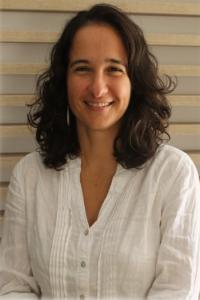Juliana Maria Leite Nóbrega de Moura Bell
CAMPOS Faculty Scholar (2015-2016) and Assistant Professor of Food Science and Technology
Dr. de Moura Bell holds a Ph.D. in Food Technology from the State University of Campinas (UNICAMP), Sao Paulo, Brazil. She completed her Ph.D. training in France at the European Institute of Membrane (IEM) and Agricultural Research for Development (CIRAD) where she worked on the enzymatic synthesis of structured lipids and its purification by the use of membrane filtration and supercritical carbon dioxide extraction (SCCO2).
She has previously worked at Iowa State University on the development of a green extraction technology of oil, protein and carbohydrates from soybeans. This clean extraction technology is able to replace the use of hazardous and polluting hexane, commonly used in the conventional extraction process. The use of water, enzymes, and mechanical treatments enables the fractionation of soybeans into fractions that can be further processed to produce high added value food, animal feed, and fuel.
For the last three years, Dr. de Moura Bell has worked on the development of sustainable processes to recover bioactivity oligosaccharides (prebiotics) from dairy streams. She has been part of a multidisciplinary project that involves many researchers from the Foods for Health Institute and is funded by a million dollar Gates Foundation Grant on infant nutrition.
Since July 2015, she has joined the UC Davis Faculty cohort as a CAMPOS Faculty Scholar with a joint appointment in the Departments of Food Science and Biological and Agricultural Engineering (http://foodscience.ucdavis.edu/people/faculty/bell.html).
Dr. de Moura Bell research includes the development and application of environmentally friendly technologies to replace the incumbent technology for extracting and fractionating of major food components such as oil, protein, and carbohydrates. Specifically, she is interested in bio-processing techniques such as enzyme-assisted aqueous extraction, fermentation, and less harsh techniques like supercritical and subcritical extractions. Her laboratory research interests include: 1) Scaling-up extraction and downstream recovery processes from laboratory to pilot-scale; 2) Determining the effects of processing conditions (extraction, heat treatment, enzymatic modifications and recovery strategies) on the functionality and biological activities of food components, and 3) The conversion of agricultural waste streams/food processing by-products into high added-value compounds.




